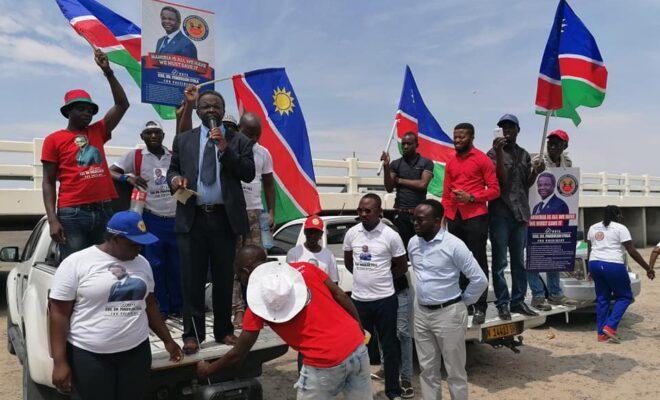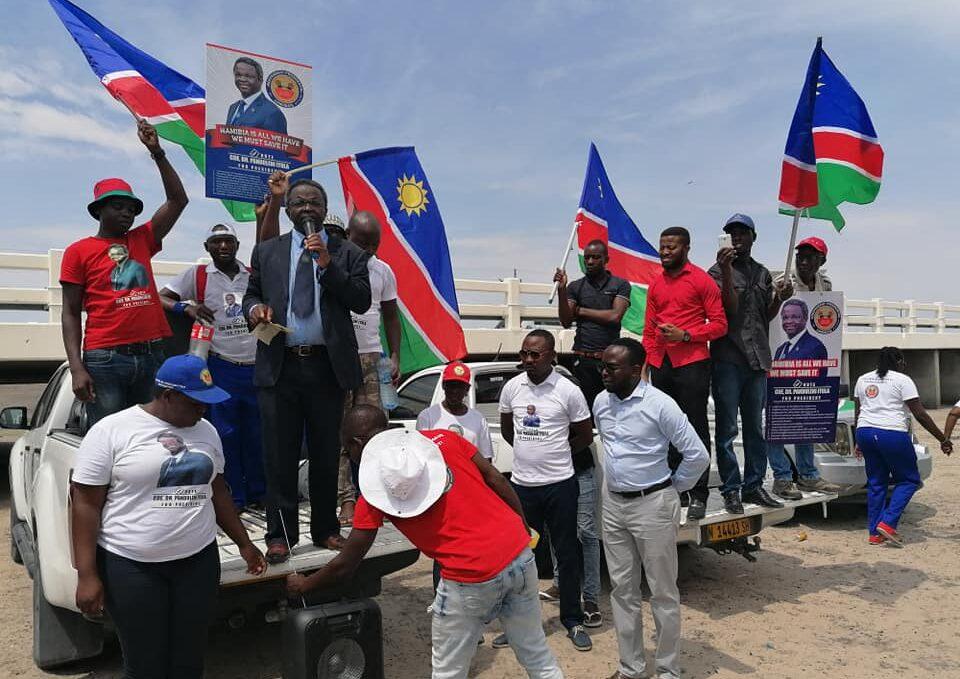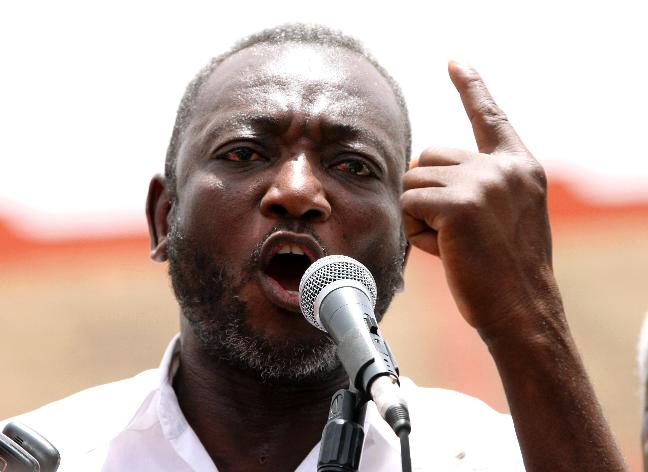An interesting election in Namibia, at last

A 62-year-old dentist and Icelandic corruption scandal have injected some unpredictability into a usually predictable contest.

Panduleni Itula, a presidential contender in the Namibia elections, at a rally in November 2019. Credit: Dr Panduleni F B Itula.
Ever since Namibia’s first post-independence elections in 1994, it has never been difficult to predict the outcome. Even with a lack of opinion polling, it has always been clear that the ruling SWAPO party would win a comfortable two-thirds majority in the National Assembly and that its presidential candidate would perform at a similar level.
Even as other former liberation movements have lost ground in South Africa, Mozambique and Angola, SWAPO has retained its popularity. In 2014, it reached a likely high-water mark of 80%. Its presidential nominee Hage Geingob garnered a remarkable 87%.
Five years later, however, a stumbling economy, a surprise presidential candidate, and a major corruption scandal have combined to make these elections Namibia’s most competitive yet. SWAPO still looks nailed on to win the National Assembly – and probably retain its two-thirds majority – but President Geingob may be punished in the presidential poll.
An economy in trouble
On 27 November, 1.3 million Namibians will go to the polls for the sixth elections since independence in 1990. The great promise of those early years now seems long gone. Namibia today is suffering from surging unemployment levels, continuing poverty, and the unwanted accolade of being one of the most unequal countries on earth.
The last five years have been particularly grim. The economy went into negative growth in the second quarter of 2016 and has not emerged since. The level of public debt as a percentage of GDP has more than doubled since 2014, from 23% to 49%.
In the face of this mounting debt, the government has introduced austerity measures rather than try to engineer an economic stimulus. It has washed its hands of responsibility for the troubles, blaming instead a triple whammy of global economic headwinds, declining commodity prices, and a persistent and severe drought.
There’s no doubt the government has faced difficult circumstances beyond its control. A vicious 2016 drought wiped out swathes of livestock, slashed crop yields, and threatened the water supply in the capital Windhoek. Moderate rains only returned briefly in 2017 before another drought set in. In May 2019, President Geingob was forced to declare his second drought emergency since taking office. By September over 700,000 people countrywide (more than a quarter of the population) needed food aid.
But the government has also contributed to the crisis itself. It spooked investors, for example, by proposing a policy that would require all businesses to cede 25% of their ownership to the previously disadvantaged. That particular clause was later withdrawn and the law of which it would’ve been a part of has yet to come to parliament, but uncertainty around the final bill still prompts questioning from prospective investors. This situation has not been helped by the passing of the Namibia Investment Promotion Act in 2016. The private sector claims this law puts their activities at the mercy of ministers who wield a disproportionate amount of discretionary power. The act is now being revised in response to criticism, but the damage may already have been done. With investment lacking and jobs in short supply, Namibia’s unemployment rate is at 33% and has reached 46% among under-35s.
A challenger emerges
Such economic travails are often the prelude for political disruption and it is not surprising that the election campaign has been marked by spontaneous gatherings of young people chanting “We want change!”
Many of these protesters’ frustrations have found a lightning rod in 62-year-old dentist Panduleni Itula whose candidacy was confirmed in late October. Itula has spent much of his life in the UK and only returned to Namibia in 2013. He has made much of his membership of SWAPO and has refused to resign from the ruling party. He alleges that Geingob is not the legitimate SWAPO candidate having been fraudulently chosen at a 2017 party congress. Some of his backers are among those who lost out at that summit when Geingob stamped his dominance on the party.
Itula’s policy platform has received little attention during the election campaign. Like most of the opposition, his manifesto focuses on land redistribution, housing provision, fighting corruption and reducing the size of government. While his ideas may seem lacklustre, however, his campaigning style has caught the public imagination. He moves from town to town at a swift pace, always stopping his cavalcade at the town’s limits and leading his supporters through the main streets. The humble manner of his approach contrasts sharply with SWAPO’s expensive roadshow which has seen large crowds gathering in most towns, some undoubtedly attracted by the presence of Namibia’s top music stars.
Itula’s rivalry could reduce Geingob’s vote share. Some voters may be confused as to the real SWAPO candidate, while others will deliberately split their vote between SWAPO in the parliamentary poll and Itula in the presidential race. There is also a tribal factor. Geingob is from the minority Damara ethnic group. Itula is an Oshiwambo speaker from the majority tribe that dominates the north of Namibia. If people in this area vote along ethnic lines, Geingob’s vote will be further dented.
Based on early voting at foreign missions and for key officials, security forces and seagoing personnel on 13 November, Itula is running neck-and-neck with Geingob. This is likely to change once results start coming in from SWAPO’s rural strongholds in the north, but the early voting suggests Itula might pose a real challenge to Geingob in urban areas like the main port of Walvis Bay and the populous northern settlements of Ondangwa and Oshakati. The decision of voters in Windhoek, which has always voted solidly for SWAPO despite being by far the country’s largest urban settlement, could end up being key.
The FishRot files revealed
On 13 November, Itula and the opposition’s campaigns were given an unexpected boost. A breaking news story, announced under the headline “The Kickback Kings” in Namibia’s most read newspaper, revealed how an Icelandic fishing company had paid at least $10 million in bribes to secure Namibian fishing quotas. The coordinated investigation, which included Wikileaks, Icelandic media, Al Jazeera and The Namibian, alleged that recipients included Fisheries Minister Bernhard Esau and Justice Minister Sacky Shanghala. The two men resigned their posts immediately.
President Geingob has long faced criticism for his inaction over top-level corruption. The latest scandal, known as the FishRot files, seemed to underline this as it was revealed he had known about the allegations since 2018.
Despite this gift for his campaign, however, Itula has continued with his main obsession: the use of Electronic Voting Machines (EVMs). His focus on getting EVMs – which are only used in two countries in Africa – replaced by a paper ballot has eclipsed all his other campaign themes. Almost inevitably, he has now brought a last-minute court case seeking to stop the use of EVMs. Judgement is expected on 25 November, just two days before the election. If Itula is successful, there will be a delay of several weeks while ballots are printed and preparations for a different sort of election start over.
Either way, Namibia will soon hold its most interesting and uncertain elections to date.







Point of correction, Namibia’s post independence elecrions were in 1989…get your facts right.
People are simply tired and want to see whether a different leader will do things differently. The myth that the reason people want change is because they are tribalists is debunked by the fact that Hage was elected by more than 87% percent of the population in the last election because people thought that he was better.
buy cialis online cialis pills
how does plaquenil work chloroquine pills ic hydroxychloroquine